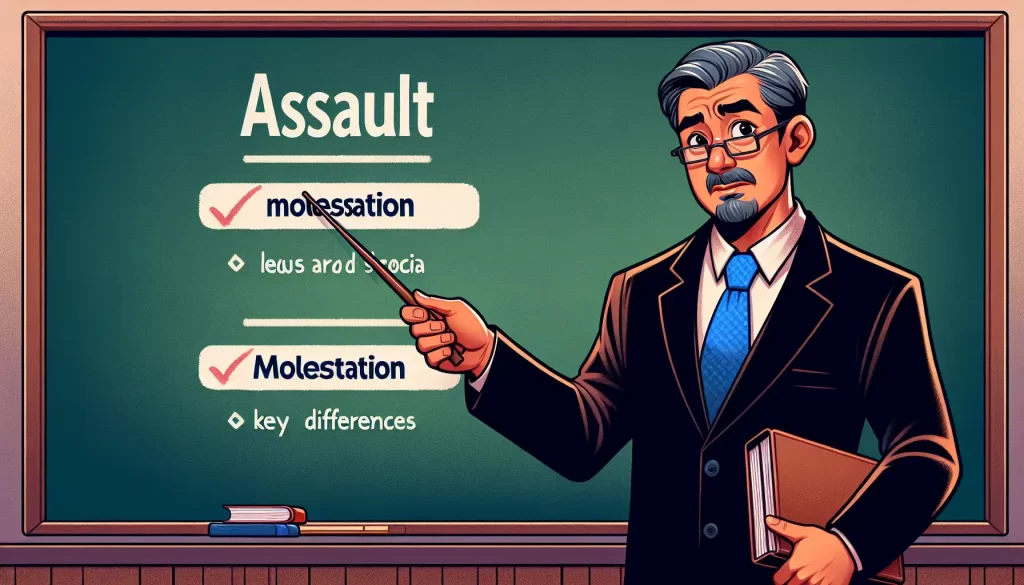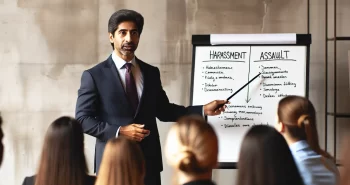Legal Differences Between Sexual Assault and Molestation

What’s the difference between sexual assault and molestation? This page explains when these acts are treated as crimes and how survivors can pursue legal action. It is intended for individuals considering civil or criminal claims, not as medical or treatment advice. Understanding these distinctions can help protect your rights and guide next steps in seeking justice.
Legal Implications Based on Victim Age
Age plays a big role here. Sexual assault covers everyone—kids and adults. But molestation zeroes in on minors, basically kids who can’t give legal consent.
How the Law Differentiates Sexual Acts
When you look at sexual assault, the actual act can cover a lot of ground. We’re talking anything from intercourse without consent to just plain creepy touching. Molestation, though, is usually about a singular or quick incident directed at a minor.
Criminal and Civil Consequences
Now, how the law handles these two can vary. Molesting a child usually gets the book thrown at you harder compared to other types of sexual assault. Kids are seen as extra vulnerable, so the legal system gets tougher on those cases, hitting perpetrators with stiffer penalties.
Getting to grips with what separates sexual assault from molestation is super important if you’re dealing with the law or seeking justice. Knowing what makes these acts different helps in understanding the shadow they cast on victims’ lives. Check out more of our stuff for a deeper dive into related issues, like what’s the difference between sexual assault and sexual abuse and what’s the difference between rape and sexual assault.
Table of Contents:
Legal Definition of Sexual Assault
Understanding the legal differences between sexual assault and molestation is crucial for survivors considering legal recourse. Sexual assault covers any unwanted sexual acts—yes, that includes stuff like penetration, coercion, and being forced to see or engage in sexual acts. And no, it doesn’t matter if you’re young or old, it can happen to anyone. So knowing the elements and levels of sexual assault is key if you’re aiming to make sense of this in legal terms.
Elements of Sexual Assault
Let’s break it down: sexual assault involves non-consensual touching or more serious stuff like coercion and exploitation. We’re talking about situations where someone ends up going through vaginal, oral, or anal acts without their agreement, or is pushed into unwanted touching or exhibitionism. Having a clear view of these elements helps in spotting and dealing with these offenses.
Degrees of Sexual Assault
Sexual assault gets split into different levels based on how bad it is and what happened around it. Depending on where you are, it could fall under first-degree, second-degree, and so on. Each level affects the legal side of things, with the age of the victim, whether there was violence or threats, and what actually occurred playing a role.
In certain places, first-degree sexual assault is hit hard with penalties, including big fines and serious jail time. The punishment usually reflects how injured the victim was and what the perpetrator meant to do. To get a hang of specific degrees and what they legally involve, check out our pieces on 1st degree sexual assault and 2nd degree sexual assault.
Learning about the elements and levels of sexual assault is vital for folks who’ve gone through such trauma and want justice and closure. Recognizing how serious these acts are and the legal paths available is crucial for survivors. By truly getting what sexual assault encompasses, they can better navigate the system and find the support they need to heal and hold perpetrators accountable.
Legal Definition of Molestation
When we dig into the issue of sexual assault, it’s critical to sort out the difference between sexual assault and molestation. Let’s unpack what molestation is all about:
The Scope of Molestation
Molestation usually covers a single act of sexual assault, often aimed at kids. It’s about the victim’s young age and the fact they can’t legally consent since they’re minors. Child molestation is specifically about one-off sexual acts against young kids, especially those under 12.
Legal Interpretations of Molestation
Legally speaking, molestation is seen as a type of sexual assault aimed at minors. The punishment for child molestation depends on the ages of both the person doing it and the child involved. As a unique crime, child molestation gets special attention in court to defend minors and keep them safe.
Grasping the differences between molestation and sexual assault is key in both law and social spheres. By getting a handle on what makes molestation unique and serious, we can better tackle and prevent sexual abuse, especially when it hits the most vulnerable among us, like kids.
Key Distinctions Between Sexual Assault and Molestation
Alright folks, let’s talk about some serious stuff today. We hear a lot about sexual assault and molestation, but what’s the real deal separating the two? We’re diving into the differences, particularly looking at the victim’s age, the nature of the contact, and how the law reacts. So, here’s the lowdown.
Age of the Victim
It’s downright crucial to talk about who we’re dealing with here in terms of age. When you hear “molestation,” think of it as something nasty aimed at kids, you know, usually a one-time thing, but still a big deal. We’re talking touching or unwanted behavior with those who can’t consent—kids under 16 or 18, and especially the little ones under 12. Ain’t nobody got the right to mess with them.
Now, sexual assault is a different ballgame. It casts a wider net, covering anything unwanted—like penetration or threats—whether you’re a kid or a grown-up. It all boils down to one word: consent. If it ain’t there, it ain’t right, no matter your age.
Nature of the Sexual Contact
What kind of terrible acts are we talking about here? Molestation usually means inappropriate touches or behavior, and it’s bad news for minors. These acts break boundaries, taking advantage of kids’ trust and innocence.
But sexual assault, that’s even heavier. We’re talking serious stuff like forced penetration—vaginal, oral, or anal—without a shadow of consent. This isn’t just about breaking trust, it’s a full-blown invasion of someone’s bodily rights, and the aftermath can be devastating on both physical and emotional levels.
Legal Ramifications
Here’s where things can get sticky with the law. Offenses like sexual assault come with a whole range of punishments, depending on like how severe the crime was and how old everyone involved was. Sexual battery against someone 12 or older? You’re looking at first-degree felony, serious time behind bars, and huge fines.
Molestation laws aim to protect kids, plain and simple. The penalties? They stick with you, leaving a mark on your record. And the harsher the offense, the tougher the slap on the wrist—or rather, the slap on your freedom.
So, why do these differences matter? Because it’s past time we all got serious about preventing this stuff and standing by victims. Knowing the nuances, we find strength to support safer environments for everyone. Kids, especially, need us to step up and shield them. So let’s do just that.
The Overlap and Interplay of Terms
Getting a grip on the difference between sexual assault and molestation is key to understanding the legal and emotional weight these tough situations carry. People often mix up these words, but they’ve got distinct features that affect how serious they can be and how the law handles them.
When Molestation Turns Into Sexual Assault
Though both involve unwanted stuff, the real split depends on what went down and how old the person on the receiving end is. Molestation usually means messing around with folks under 18, covering illegal stuff ranging from touching without permission to forcing someone into something. Sexual assault, however, doesn’t care about age—it’s about any non-consensual act.
If a molestation case gets bigger, including things like force or penetration, it might slide over into sexual assault territory. Being clued in about when one leans into the other is crucial for understanding the legal angles and making sure those affected get whatever help they need. Folks who’ve been through either need all the support, protection, and legal action they can get to patch things up and keep moving.
The Importance of Precise Language in Legal Contexts
When it comes to law and helping folks who’ve gone through this stuff, using the right words is huge. Separating molestation from sexual assault not only clears up what actually happened but also decides how the law can kick in. Different places have their spins on these terms, so keeping things straight in legal docs and when telling your story matters.
Bringing up a case of molestation or sexual assault with accurate details can beef up the support needed in court and for justice. Legal help for survivors might mean getting into criminal or civil court, as well as finding the resources to bounce back. By nailing the language and understanding the nitty-gritty of these offenses, people can better stand up for themselves or others caught up in these messy situations.
Seeing how molestation and sexual assault can mix it up shows the tricky nature of these crimes and the need to tackle them with understanding, insight, and legal savvy. By appreciating the little differences and shouting out for victim rights, we’re taking steps towards a world where everyone can feel secure and backed-up no matter what comes their way.
Long-Term Impacts on Victims
Survivors may pursue legal action to hold offenders accountable and seek compensation for harm suffered.
Legal Remedies and Compensation Options
After being sexually assaulted, life can feel completely upended. It’s pretty common for survivors to wrestle with guilt, shame, fear, and anxiety. These emotions aren’t fleeting whispers; they’re intense waves that can impact every part of someone’s day-to-day life. Trauma shows up in uninvited ways as PTSD, crushing depression or even making relationships feel like a high-wire act without a safety net.
Survivors’ mental health can feel like it’s under siege. It gnaws at their self-esteem, messes with their sense of safety, and takes a bulldozer to their quality of life. It’s important they find room in their lives for healing—professional counseling is a game-changer in starting to unlock what’s been buried and hurt.
The Need for Support and Healing
Recovery isn’t just a destination but a road walked with support hand in hand. Having the right people—a mix of caring friends, family, and seasoned therapists—can make the load of healing feel just a tiny bit lighter. Being part of a support group or sitting down in therapy creates a safe zone where they can unpack their feelings, find battle-tested coping strategies, and start to rebuild that flickering self-confidence.
Healing is a custom-fit suit. Survivors need to chase self-care, be gentle with themselves, and dive into things that encourage healing and strength. By focusing on not just the mind, but body and soul too, survivors can start to rise above the trauma, piece by piece.
Remember, if sexual assault has touched your life, you don’t have to go through this alone. Reaching out for help is a bold move towards piecing back together your identity. For more advice on seeking justice and additional resources, check out our article on how to report sexual assault.
How Survivors Can Pursue Legal Action
Dealing with the tough aftermath of sexual abuse isn’t something anyone should do alone. The path to recovery can sometimes be smoother when justice and compensation are in sight. Understanding how to use the legal system can give survivors a sense of control and hope. Let’s talk about taking that first tough step in reporting the abuse and the legal options that might be available.
Reporting Sexual Abuse
Turning in sexual abuse is a bold move. Facing those who did you harm and making sure they can’t do it to others is powerful. If you’ve experienced this trauma, reporting what’s happened to the right folks, like the police, is key. By sharing your story, you’re fighting not just for your own justice, but also for the safety of others.
When you’re ready to report, gather every tiny detail you can remember. Think about the what, when, and where. This info is helpful in painting a clear picture of your experience. Remember, you’re not tackling this alone. There’re people and organizations ready to support you through this process.
Having your voice heard can be incredibly healing and vital for seeking justice. We also have more info for you in our article on how to report sexual assault, which might offer some extra guidance.
Legal Recourse for Survivors
For survivors, legal action is a way to seek justice and make sure those responsible own up to their actions. Even if criminal charges aren’t brought against the person who hurt you, civil court offers another path. Here, you might get compensated for your suffering, help cover medical bills, or reclaim some of your lost income.
Civil lawsuits allow survivors a chance to recover some dignity and impose financial consequences on offenders, giving a sense of closure or relief. Knowing what legal steps you can take is crucial. With the right legal advice and emotional backing, it’s possible to face the legal system with confidence.
If you’ve been thinking about legal action, chat with lawyers who know their way around sexual abuse cases. These professionals can guide you on this delicate path. Moving forward with legal action can help restore some sense of control and well-being after such a jarring experience.










